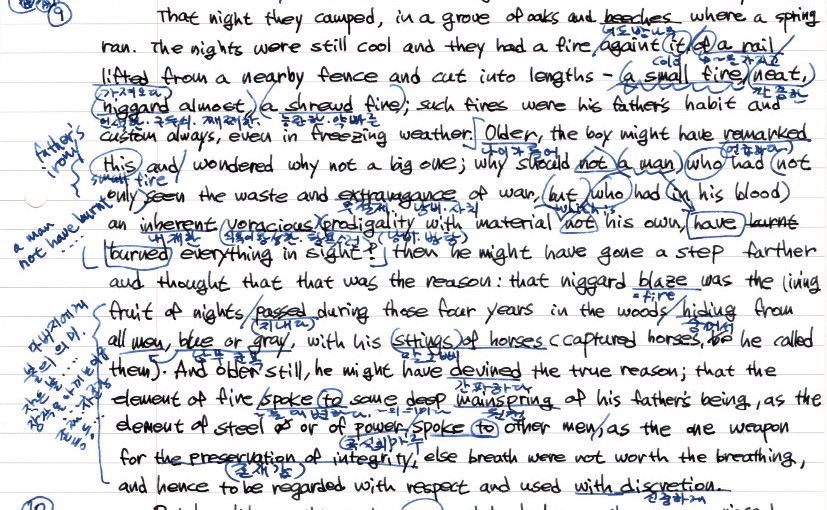Barn Burning (8) / William Faulkner
"I tried," the Negro cried. "I tole him to…"
"제가 말했는데....." 흑인이 소리쳤다.
"Will you please go away?" she said in a shaking voice. "Major de Spain is not at home. Will you please go away?"
"나가 주시겠어요?" 그녀가 떨리는 목소리로 말했다. "드 스페인 소령님은 집에 않계세요. 나가 주세요."
His father had not spoken again. He did not speak again. He did not even look at her.
소년의 아버지는 이번에도 아무말도 하지 않았다. 그는 다시 아무말도 하지 않았다. 그는 심지어 그녀를 바라보지도 않았다.
[방화범으로 피소된 법정에서도 아무말 하지 않았었다.]
He just stood stiff in the center of the rug, in his hat, the shaggy iron-gray brows twitching slightly above the pebble-colored eyes as he appeared to examine the house with brief deliberation.
그는 깔개의 중앙에 뻣뻣하게(당당히) 서 있었다. 모자를 쓴채[예의를 표하지 않음], 집안을 슬쩍(brief deliberation: 간단한 신중함) 훓어보는 것처럼 보였으나 덮수룩한 철갈색 눈썹이 자갈색 눈위에서 가늘게 떨었다.
[무심한 듯 하지만 눈썹이 바르르 떠는 것으로 보아 적의를 품은 표정이다. 그는 전쟁중 남부군 감찰관에 쫓겨 다녔던 경험을 가지고 있다. 스페인 소령은 남부군을 연상시킨다. 남북전쟁에 패했으면서 여전히 부유한 남부군 참전군인에 대한 반감이 있다.]
Then with the same deliberation he turned; the boy watched him pivot on the good leg and saw the stiff foot drag round the arc of the turning, leaving a final long and fading smear.
그런다음 역시 무심하게(same deliberation=brief deliberation) 돌아섰다. 소년은 아버지가 (몸을 돌릴 때) 성한다리를 축으로 삼는것(pivot)을 봤다. 그리고 뻣뻣한 다리[=말똥밟은 다리]를 원호를 그리며 끌었고(drag) 끝에 가서 길고 엷어지는 얼룩[말똥 자욱]을 남기는 것을 봤다.
His father never looked at it, he never once looked down at the rug. The Negro held the door. It closed behind them, upon the hysteric and indistinguishable woman-wail.
소년의 아버지는 그것(it=말똥 자욱)을 전혀 못본체 했고 한번도 내려다 보지 않았다. 흑인이 문을 잡고 [나가라는 듯이] 있었다. 문이 신경질적이며 알 수 없는 여자의 울부짖음(wail)과 함께(upon) 그들(=소년과 아버지) 뒤에서 닫혔다.
His father stopped at the top of the steps and scraped his boot clean on the edge of it. At the gate he stopped again. He stood for a moment, planted stiffly on the stiff foot, looking back at the house.
아버지는 계단 꼭데기에 서서 그의 발을 깨끗히(clean: [부사] 깨끗이, 모조리) 계단 모서리에 문질렀다(scrape). 그는 다시 대문에서 멈췄다. 잠시 멈췄고 뻣뻣한 다리로 꼿꼿히 뿌리밖은 듯 서서(planted stiffly) 집을 향해 뒤돌아봤다.
[아버지는 저는 다리를 집고 섰는데 그 다리는 예전 남부군 감독관의 추격을 받아 총알이 박혔었다.]
"Pretty and white, ain't it?" he said. "That's sweat. Nigger sweat. Maybe it ain't white enough yet to suit him. Maybe he wants to mix some white sweat with it."
"멋진 하얀 집이군, 그렇지?" 그가 말했다. "아주 멋지네. 흑인의 땀(으로 지은 집)이야. 아직 흡족할 만큼 하얗지 않은 모양이군. 백인의 땀을 더 섞고(갈아넣고) 싶은가보군."
--------------------------------------------------------------------------------
Two hours later the boy was chopping wood behind the house within which his mother and aunt and the two sisters (the mother and aunt, not the two girls, he knew that; even at this distance and muffled by walls the flat loud voices of the two girls emanated an incorrigible idle inertia) were setting up the stove to prepare a meal,
두시간 후 소년은 집 뒤편에서 장작을 패고(chopping wood) 있었고, 집안에서 어머니와 이모 그리고 두 누나가 식사 준비를 위해 난로를 피우고 있었다(setting up the stove). (좀 떨어져서도 두 누나의 구제할 수 없는 거드름(incorrigible idle inertia) 피우는 소리가 벽을 두드리는 것으로 보아 소년은 어머니와 이모가 일하고 있고 걸 알고 있었다.)
when he heard the hooves and saw the linen-clad man on a fine sorrel mare, whom he recognized even before he saw the rolled rug in front of the Negro youth following on a fat bay carriage horse
소년이 말발굽 소리(hooves)를 듣고 훌륭한 검정색 암말(mare)을 탄 린넨 옷(linen-clad)을 입은 남자를 봤을 때는 그전에 살찐 마차용 말을 타고 뒤따르는 젊은 흑인의 앞에 둘둘만 깔개를 알아채기 전이었다.
[흑인이 마차용 말을 앞세우고 있었으나 검정 암말을 탄 남자의 위세가 먼저 눈에 들어왔다.]
- a suffused, angry face vanishing, still at full gallop, beyond the corner of the house where his father and brother were sitting in the two tilted chairs; and a moment later, almost before he could have put the axe down, he heard the hooves again and watched the sorrel mare go back out of the yard, already galloping again.
잔뜩(suffused) 화가난 얼굴은 사라졌지만(vanishing; 스쳐지나감) 아버지와 형이 두 접이 의자에 앉아 있던 집모퉁이 넘어로 말발굽소리가 여전했다. 잠시후 소년이 도끼를 내려놓자 마자 다시 말굽소리를 들었고 암말이 마당 넘어에서 되돌아오며 다시 내달리는 것을 봤다.
Then his father began to shout one of the sisters' names, who presently emerged backward from the kitchen door dragging the rolled rug along the ground by one end while the other sister walked behind it.
소년의 아버지는 누나중 한 이름을 소리쳐 부르기 시작했다. 부엌 뒷문에서 재깍 튀어나와(emerge) 둘둘만 깔개의 한쪽을 들고 땅에 끌고 있고 다른 하나는 그 뒤를 따르는 중이었다.
[참고] 방송대 영문학과 신현욱교수님의 강독, "Barn Burning"[헛간방화] by William Faulkner(translated in Korean by Hyun Shin)(영소설 읽기) [19]
--------------------------------------------------------------------------------




















